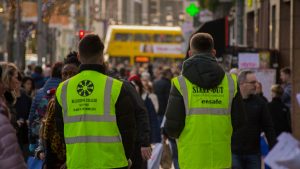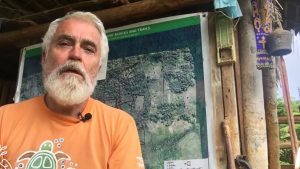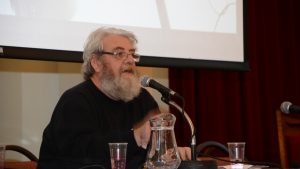Go home from Goma
 It is over a year since Gerry Clarke joined the Jesuit Refugee Service in Goma, DR Congo, which is about as troubled and dangerous a spot as any in Africa. Though the crushing of the rebellion is supposed to be complete, and the war over, this weekend Medecins Sans Frontieres has accused the Congolese army of enticing Hutus to a MSF clinic near Goma and then killing over 60 of them. Gerry describes how difficult it is to move people from the dependent and protected life-style of the refugee camps to managing their own lives at home. Here is his latest bulletin.
It is over a year since Gerry Clarke joined the Jesuit Refugee Service in Goma, DR Congo, which is about as troubled and dangerous a spot as any in Africa. Though the crushing of the rebellion is supposed to be complete, and the war over, this weekend Medecins Sans Frontieres has accused the Congolese army of enticing Hutus to a MSF clinic near Goma and then killing over 60 of them. Gerry describes how difficult it is to move people from the dependent and protected life-style of the refugee camps to managing their own lives at home. Here is his latest bulletin.
LIFE AFTER THE CAMPS
Gerry Clarke SJ
The United Nations High Commission for Refugees made it quite clear but nobody really believed them. The Camps around Goma were going to be closed and the displaced people encouraged to go home. Officially the war is over and the rebel FDLR have been hunted to oblivion with the success of the joint Congolese Army-UN operation called Kimia 2. But many NGO’s were taken by surprise when it happened: we had been lulled into a false sense of permanency by the sight of thousands of huts spread over the lava fields outside Goma. Food supplies had ceased in the camps for a month and when the camp residents saw that supplies would not start again they pulled up the sticks and the plastic sheeting which had protected them for over a year in their tiny “huttes” and abandoned the sites.
Then began the work of closing the latrines and pulling up the water pipes that had served so many thousands of temporary dwellers; the land was handed back to the government and local people took possession of whatever was left. On my first visit to Bulengo, the site of the camp which I knew best, there were people still picking through the remains, scavenging for leftovers: perhaps a bundle of tattered banknotes forgotten in a crevice or a dropped mobile phone. It was quite strange to return to this site where we used to work every day, especially when a patrol of soldiers challenged our presence on the site. A certain amount of charming banter and a foot on the accelerator extricated us from what might have become a difficult situation!
Some of the camp residents haven’t gone far and they have reconstructed the “huttes” near the roads heading into the interior: they’re still unsure about safety back in the villages. Reports continue to come in with stories of exactions and looting and surprisingly there are still new arrivals at Goma. So one camp remains open although even it won’t survive very long I think.

Needless to say our work in the camps has come to an end. Income-generating activities with victims of sexual violence have ceased, our informal education programme which trained residents in Hairdressing, Bicycle repair, Bakery, Tailoring and Literacy has been closed. And our work with the most vulnerable camp residents has all but finished. We maintain a light presence in the one remaining camp, called Mugunga 3. Here the remainder of our staff follow up the most extreme cases of vulnerability, like the Papa whom Beatriz found alone in his “hutte”. He suffers from throat cancer and hadn’t eaten for two days. “Why didn’t you go to the Camp Health Centre?” “How can I walk there if I haven’t any strength!” Although the Camp authorities are distributing no food there are cases of extreme hunger and illness which cry out for help. To these few people we supply fruit, flour and sugar. Avocado pears grow abundantly on the tree at the JRS house in Goma: they are very nutritious and a box of them went out to Mugunga 3. They were delighted with them and we found a good way of using this beautiful fruit.
Now JRS Goma is preparing to follow the returnees. Our work does not finish when the displaced people go home, JRS always follows them to their villages and helps them settle in. Typically we will focus on education support and of course, vulnerable people. After two reconnaissance missions we have decided to set up in the mountains of Masisi where many of the displaced are resettling. Masisi is something of a Shangri La when you see it for the first time. As the 4×4 Land Cruiser finishes its long climb to the mountain pass of Katale, a panorama of green pasture and alpine mountains spreads before you. The abrasive clumps of black lava which cover the fields around Goma give way to the rich mud and lush grasses of the pastures of Masisi. Winding down the sloshy track into the valley you pass the dairy farm of Lushebere which produces the most delicious cheeses and buttermilk (an evening specialty at JRS: buttermilk, mashed banana and a dab of honey) and then on into the town with its 1950’s prison block and dwellings terraced up the mountain slopes.

To date our base at Masisi has been the Catholic Parish where we were warmly welcomed by Fr Theodore, the parish priest. He was more than delighted to accompany us up into the mountains behind the town in search of schools with special needs, and after quite a scary slip-and-slide up the mountain path we had to leave the vehicle and continue on foot. The local guide assured us the village we wanted to see was only another twenty minutes away, “just a little bit further and around the corner”. Two exhausting hours later we limped into the village like true European explorers, red in the face and dying for a Coca Cola. The schools are indeed in a bad way: roofs caving in, walls disintegrating, and consequently the cancellation of classes when it rains. In talking with the local department of education we learned that the parents of these schools are eager to help as best they can. So our plan is to supply the basics for what is called in French a “salle évolutive” or “progressive classroom”. JRS will put down the concrete base and the parents will build the wooden frame which we will top off with corrugated iron sheeting. Gradually, according to their means, the parents will add boards to make classroom walls or construct them in wattle and daub which is easily found locally. In this way we hope to complement the efforts of an active and concerned community.
But we will need a base for our team in Masisi and this was one of our major concerns in going out there on our reconnaissance missions. Thankfully we succeeded in renting what may be the only available house in the town and we were welcomed by other NGO’s like our Irish colleagues at Concern Worldwide who were in the middle of organizing a Voucher Fare for Non Food Items.
When we eventually arrived at the village up in the mountains a warm welcome was awaiting us. We were given a place to sit down and rest and some Coke and Fanta thrust into our hands – a welcome relief after the gruelling climb. Of course the arrival of an NGO in an area signals possible benefits for the community and that is why we are here. But people were especially delighted when we turned up that afternoon unannounced because when the “whites” arrive they said maybe peace is really on the way. Wouldn’t that be a great gift to share with the people of North Kivu Province in the Eastern Congo.
Gerard J.Clarke SJ
Coordinator of Programmes
Jesuit Refugee Service
Goma, North Kivu
Democratic Republic of the Congo












